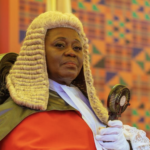
The Economic Fighters League has expressed concern over the removal of Chief Justice Gertrude Torkornoo, warning of its broader implications for judicial independence and constitutional democracy in Ghana.
While acknowledging that the decision followed the procedures outlined in Article 146 of the 1992 Constitution, the group stressed the need to examine the wider consequences for governance and public confidence in the judiciary.
“While we recognise the constitutional basis of this action, it is imperative to interrogate the broader implications for judicial independence, constitutional governance, and public trust in the judiciary,” the group said in a statement.
Criticism of Torkornoo’s Tenure
The Fighters League described the former Chief Justice’s tenure as one marred by “jurisprudential controversies” that significantly eroded confidence in the Supreme Court.
It cited the Court’s “remarkable expedition” in handling a case on the declaration of vacant parliamentary seats while failing to resolve the long-standing disenfranchisement of residents in the Santrokofi, Akpafu, Likpe, and Lolobi (SALL) areas.
“For four years, Ghanaians entitled under Article 17(1)–(3) to equal protection and participation in governance were denied representation in Parliament — an omission which constituted a grave affront to both the Constitution and the principles of democratic accountability,” the statement said.
The group further criticised what it described as the “selective application of judicial urgency,” suggesting that the judiciary under Justice Torkornoo had aligned itself with “the narrow interests of the Executive.”
“The outcome has been the erosion of public faith in the courts as the final arbiter of justice,” the statement added, cautioning that any use of judicial office for political expediency compromises the authority and integrity of the judiciary.

Call to Action
Although stating it took no joy in the personal downfall of Justice Torkornoo, the Fighters League described the episode as a cautionary tale about the dangers of perceived partisanship in the judiciary.
The group concluded with a three-point demand:
Full publication of the committee’s report leading to the Chief Justice’s removal, in the interest of transparency and accountability;
Institutional reforms to insulate the judiciary from partisan influence and ensure decisions are grounded in the Constitution and the rule of law;
Protection of the former Chief Justice’s right to challenge the allegations that led to her removal.
“The strength of Ghana’s democracy rests upon the independence and integrity of its judiciary, the legislature, and the executive. It is incumbent upon us all to ensure that never again shall constitutionally protected rights be sacrificed for partisan advantage,” the statement concluded.
